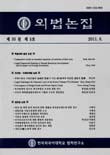자백배제법칙의 근거와 임의성의 판단
The Rationale of the Confession Rule and the Voluntariness
- 한국외국어대학교 법학연구소
- 외법논집
- 제35권 제3호
-
2011.08193 - 214 (22 pages)
- 228

It has been controversial topic on the rational of the confession rule, enacted in the article 309 of Korean Criminal Procedure Code. The article 309 provides the exclusion of involuntary confessions made under torture, battery, threat, deceit or after prolonged custody as well as confess ions whose voluntariness is doubtful. There has been a lot of arguments surround ing this article, and they are mainly about the reason why the confession taken under some wrongful situations is inadmissible - which is because the confession is illegal or does not have reliability. If we take reliability test, the confession is excluded based on its reliability, not on its voluntariness. Then confess ion is admissible when it is reliable even though obtained involuntarily. It may, therefore, be resonable conclude that the confession is excluded because it is obtained illegally. Korean Criminal Procedure Code amendment imposed the exclusionary rule of illegally collected evidence on the article 308-2 lately. It means any evidence cannot be obtained through the violation of due process of law. This article, however, has not been settled yet. The argument on the scope and the standard of the exclusionary rule still goes on. Moreover, this revision makes another issue on the relation between the confess ion rule and the exclusionary rule. If the exclusion of confess ion is based on its illegality, the matter is which principle - exclusionary rule or confess ion rule - is applied on that process. Under the situation like that, th is study tries to make a new approach to interpret ‘illegality’ which can make difference between illegality on the article 309 and the 308-2.
Ⅰ. 서론
Ⅱ. 자백배제법칙의 의의와 연혁
Ⅲ. 자백배제법칙의 이론적 근거
Ⅳ. 임의성의 판단
Ⅴ. 위법수집증거배제법칙과의 관계
Ⅵ. 결론 - 자백배제법칙의 의의와 위법배제설의 재검토
참고문헌
Abstract
(0)
(0)